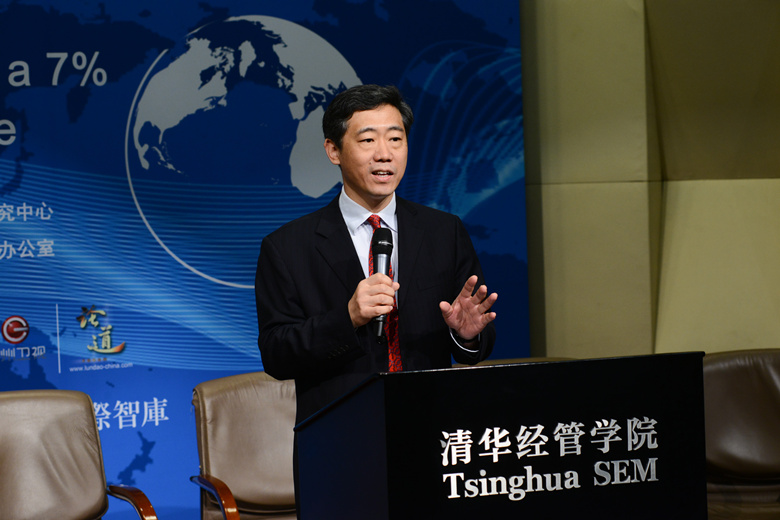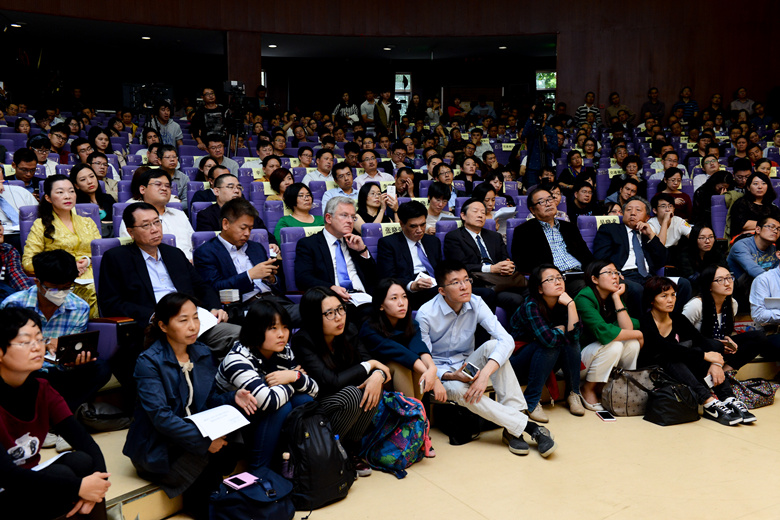No. 25 | Maintaining A Growth Rate of Seven Percent
The afternoon of October 18, 2015 witnessed the staging of the 25th Center for China in the World Economy (CCWE) Forum of Tsinghua University with the theme of “Maintaining a Growth Rate of 7%” in the International Auditorium of Weilun Building. Experts gathered to discuss China’s development in the last quarter of 2015 and shared their views of the ongoing trends in the Chinese economy. ZHU Guangyao, Vice Minister of Finance of the People’s Republic of China, ZHANG Xiaoqiang, Executive Vice Chairman of China Center for International Economic Exchanges, QIU Baoxing, Counselor of the State Council and President of Urban Planning Society of China, WEI Jie, Professor at the School of Economics and Management, Tsinghua University, HUANG Yiping, Associate Dean of the National School of Development of Peking University and member of the Monetary Policy Committee of the Central Bank, WU Xiaoqiu, Director of the Institute for Finance and Securities Studies of Renmin University, Mel CARVILL, member of the Executive Committee of PPF Group and member of the Board of Directors of Home Credit Group, and Francis LUI, Director of the Department of Economics, HKUST, among others, were invited and present at the event. Professor David Daokui Li, Director of CCWE, chaired the forum.

Chairman Zhang Xiaoqiang kicked off the forum by looking back on the nine principal expectation indicators, including a GDP growth rate of 7% which was put forward by Premier LI Keqiang in the Government Work Report at the beginning of the year. At this moment, it looks possible to achieve a growth rate of approximately 6.9% for year 2015. Such speed is already one of the highest (with India the only exception) among all major economies in the world. China has become a leading player in global development in this tough 2015. Mr. Zhang further noted that China’s economy is experiencing positive changes and pressure all at the same time. In conclusion, he said that importance should be attached to the quality, effectiveness, and sustainability of the nation’s economic development.
Vice Minister of Finance, Zhu Guangyao, followed with another keynote speech. Based on what has been discussed at the recent IMF-World Bank meeting in Lima, Minister Zhu provided an analysis of the basic situation of China and the world economy. He pointed out that the current world economy is at a critical time with few signs of recovery. For China, the global economic environment has been extremely complex and difficult in 2015, and the key to maintaining a medium-to-high growth rate is to stick to the policy of reform and innovation initiated by the CPC Central Committee and the State Council.
Then, Professor David Daokui Li announced the grand release of CCWE’s macroeconomic analysis and forecast report for the third quarter of 2015. The report, themed "Complex Situation Testing Perseverance as Stable Economic Growth in Sight," points out that the present world economy is at a difficult time and China and the United States are in a game of expanding their friendship circles. The U.S. kick started its global economic strategy with the TPP, which is of limited negative impact on China. China should maintain steady growth in its domestic economy and be active in learning from the experience of the Shanghai Free-trade Zone, among others, in addressing international competition and risks. The country should also maintain stability in the value of the RMB, accelerate progress in the negotiations for RCEP, the Sino-ASEAN Free-trade Zone, the China-Japan-South Korea Free-trade Zone, etc., and expand its international influence. According to the report, the downward trend will hopefully reach a stop and China’s economy will stabilize after hitting bottom. It is believed that the economy will grow at the rate of 6.8% in 2015 and rise to 6.9% in the coming year. Li said that the Chinese economy needs “acupuncture therapy” which means to go target specific areas. For instance, reducing financing costs of the real economy and boosting enthusiasm of local governments in carrying out growth-stabilizing moves while concentrating on important reform measures such as SOE reforms and new-type urbanization.
This was succeeded by a more profound and direct exchange of views between the distinguished guests and the audience on current hot topics when it was time for free discussion.
Mr. Qiu Baoxing thought that a secured growth rate of 7% and environmental protection are two bottom lines for the security of the national economy and that the growth rate of GDP should be between 6.5% and 6.7% during the 13th “Five-year Planning Period”. With regard to the development of the real property industry, Counselor Qiu pointed out that the real property market will certainly develop in a direction of relatively significant division, which denotes some rises and some falls. The real property market in China is unique and China is in the process of rapid urbanization, due to which the amazingly large proportion of real property in the national economy is understandable. This process has resulted in a large amount of carbon emissions. It is estimated that the urbanization process will approach its end by 2030 and carbon emissions will naturally fall due to the attention given by the Chinese Government to energy saving and emission reduction.
Professor Huang Yiping shared his view on the current monetary policy of the Central Bank and pointed out that our monetary policy is relatively steady at present. He predicted that the downward pressure on growth may continue, arguing that the rebound from the bottom is probably temporary and not sustained. The stress on employment is significant, too. In this case, proper relaxation of counter-cyclic macroeconomic policy is understandable. From the perspective of monetary policy, there is still space for short-term and long-term interest rates to move downward. With respect to doubts due to the recent reform of the exchange rate, Professor Huang said that the Central Bank did plenty of communication in advance and that the main cause for the instability was the overlaid unstable elements of the market.
Professor Wei Jie noted that, besides the rate of growth, economic restructuring is even more important, and the development of modern manufacturing may become the most crucial indicator for the 13th “Five-year Planning Period” while expressing agreement with CCWE in its forecast on China’s economic growth. He emphasized the great significance of the “Belt & Road” Initiative to the development of Central and West China and the important opportunities for the development of the construction sector and the industry related to construction equipment.
As far as the question of the stock market is concerned, Professor Wu Xiaoqiu pointed out that there is no extraordinary relevance between China’s stock market and the whole macroeconomy in the present cycle. This summer, China’s stock market faced the first real crisis in 25 years since the establishment of the two stock exchanges with a decrease of over 20% in the indices in two weeks. According to Professor Wu’s analysis, this crisis was mainly a result of the investor’s indifference to risks, the abetting by the mass media, and the negligence of duty of the regulatory authority as well as the mammoth leverage and inflated programmed transaction, etc. Under the circumstance of high leverage, fragility becomes endogenetic across the entire market and the unreasonably high trading volume further signifies such fragility. Consequently, a collapsing drop is inevitable.
Mel Carvill, an expert from abroad, noted the importance of China in the global economy, saying that a slowing Chinese economy will produce a far-reaching impact. In respect of the internationalization of the RMB, he thought that the access of RMB to SDR can help achieve trade balance more effectively and enable a more important role for the RMB to play. China, of course, will undertake more responsibilities and risks accordingly.
An account of the views of Hong Kong’s academia and business sector on China’s economic growth was provided by Professor Francis LUI. In response to Professor David Daokui Li’s question of whether or not a new round of financial crisis will take place in Hong Kong, Professor LUI said that that it is not likely based on either the stock market or the real property market and that a crisis similar to that in 1998 will not happen. In consideration of the 1998 financial crisis in Hong Kong, he emphasized that attention should be paid to reform and the benefits provided to the general public via government bailouts.

At the end of the forum, the experts replied in detail to related questions from the audience on the legislation regarding the real property tax and estate tax, future development of China’s stock market, and the likelihood of a further reduced interest rate by the Central Bank, among other topics. The event was rounded off with prolonged applause.




